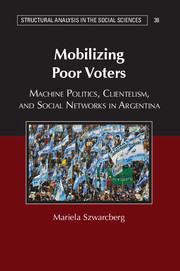Description
Mobilizing Poor Voters
Machine Politics, Clientelism, and Social Networks in Argentina
Structural Analysis in the Social Sciences Series
Author: Szwarcberg Mariela
Using network analysis and quantitative and qualitative data, this book explains why candidates use clientelistic strategies to mobilize poor voters.
Language: English
Subject for Mobilizing Poor Voters:
Approximative price 27.67 €
In Print (Delivery period: 14 days).
Add to cart
Mobilizing Poor Voters
Publication date: 07-2015
185 p. · 15.2x22.9 cm · Paperback
Publication date: 07-2015
185 p. · 15.2x22.9 cm · Paperback
Approximative price 85.25 €
In Print (Delivery period: 14 days).
Add to cart
Mobilizing Poor Voters
Publication date: 07-2015
192 p. · 15.6x23.6 cm · Hardback
Publication date: 07-2015
192 p. · 15.6x23.6 cm · Hardback
Description
/li>Contents
/li>Biography
/li>
Democracy has provided opportunities for political representation and accountability, but it has also created incentives for creating and maintaining clientelistic networks. Why has clientelism consolidated with the introduction of democracy? Drawing on network analysis, Mobilizing Poor Voters answers this question by describing and explaining the emergence, maintenance, and disappearance of political, partisan, and social networks in Argentina. Combining qualitative and quantitative data gathered during twenty-four months of field research in eight municipalities in Argentina, Mobilizing Poor Voters shows that when party leaders distribute political promotions to party candidates based only on the number of voters they mobilize, party leaders incentivize the use of clientelistic strategies among candidates competing to mobilize voters in poor neighborhoods. The logic of perverse incentives examined in this book explains why candidates who use clientelism succeed in getting elected and re-elected over time, contributing to the consolidation of political machines at the local level.
1. Politics on the ground: mobilizing poor voters in Argentina; 2. The microfoundations of political clientelism; 3. Building a party network: political, partisan and social networks in Argentina; 4. Moral hazard and asymmetric information in clientelistic networks; 5. The logic of perverse incentives; 6. Scaling up: the logic of perverse incentives at the subnational level; 7. Politics on the ground: a comparative perspective; 8. Conclusions: winners lose.
Mariela Szwarcberg is an Assistant Professor of Political Science at Reed College. She specializes in the study of democracy with a geographic focus on Latin America. Her research has been supported and funded by the Fulbright Commission, the Social Science Research Council, and the Mellon Foundation. Her articles have appeared in the Journal of Comparative Politics, the Latin American Research Review, Party Politics, Social Networks, Latin American Politics and Society, and the Women's Policy Journal of Harvard. She received her PhD in Political Science from the University of Chicago.
© 2024 LAVOISIER S.A.S.




